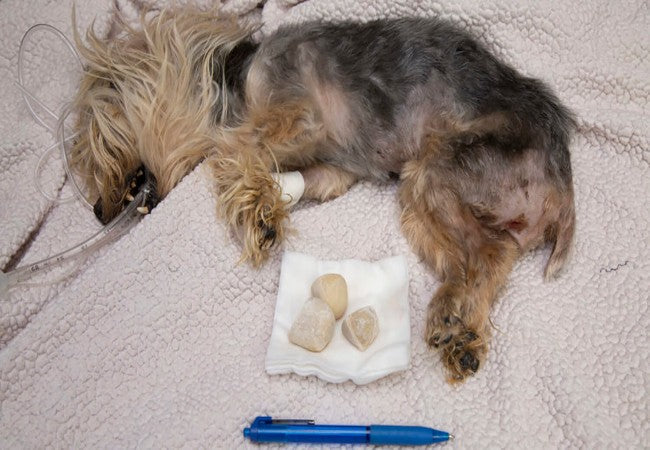Bladder Stones in Dogs: Vet-Approved Causes, Symptoms & Treatments (2025 Guide) 🐶💊

In this article
Bladder Stones in Dogs: Vet-Approved Causes, Symptoms & Treatments (2025 Guide) 🐶💊
By Dr. Duncan Houston BVSc
As a veterinarian, I occasionally encounter cases of bladder stones in dogs, a serious condition that can significantly impact a dog's health. Understanding this condition is crucial for early detection and effective treatment. This comprehensive guide aims to educate pet owners on the causes, symptoms, and treatment options for bladder stones in dogs.
🧬 What Are Bladder Stones?
Bladder stones, or uroliths, are hard mineral deposits that form in a dog's urinary bladder. They begin as microscopic crystals that aggregate over time, leading to discomfort, urinary issues, and potential blockages. Common types include:
- 🧪 Struvite Stones: Often associated with urinary tract infections.
- 🧪 Calcium Oxalate Stones: Linked to dietary factors and certain metabolic conditions.
- 🧪 Urate Stones: Common in breeds like Dalmatians due to genetic factors.
- 🧪 Cystine Stones: Resulting from inherited metabolic disorders.
🐞 Causes and Risk Factors
Several factors can contribute to the formation of bladder stones in dogs:
- 🦠 Urinary Tract Infections (UTIs): Bacterial infections can alter urine pH, promoting stone formation.
- 🥩 Dietary Imbalances: Diets high in certain minerals can predispose dogs to stone development.
- 💧 Inadequate Water Intake: Concentrated urine increases the risk of crystal formation.
- 🧬 Genetic Predisposition: Some breeds are more susceptible to specific types of stones.
- 🧓 Age and Sex: Middle-aged to older dogs, and certain sexes, may be at higher risk depending on the stone type.
⚠️ Symptoms of Bladder Stones
Signs of bladder stones can vary but often include:
- 🩸 Hematuria: Presence of blood in the urine.
- 😣 Straining to Urinate: Difficulty or pain during urination.
- 💦 Frequent Urination: Increased need to urinate, often producing small amounts.
- 🚫 Inability to Urinate: A medical emergency requiring immediate attention.
- 🛌 Lethargy: Decreased energy levels.
- 📉 Loss of Appetite: Reduced interest in food.
If your dog exhibits any of these symptoms, consult your veterinarian promptly.
🩺 Diagnosing Bladder Stones
Diagnosis involves a combination of clinical evaluation and diagnostic tests:
- 🔬 Urinalysis: To detect crystals, blood, or signs of infection in the urine.
- 🧪 Urine Culture: To identify any bacterial infections.
- 🖼️ Imaging: X-rays or ultrasounds to visualize stones within the bladder.
- 🔍 Stone Analysis: If stones are retrieved, analyzing their composition helps guide treatment and prevention.
💊 Treatment Options
Treatment strategies depend on the type, size, and number of stones:
- 🥗 Dietary Management: Special diets can dissolve certain stones, like struvite, and prevent recurrence.
- 💉 Medications: Antibiotics for infections or medications to alter urine pH and composition.
- 🔪 Surgical Removal: Cystotomy may be necessary for large or obstructive stones.
- 💧 Urohydropropulsion: A non-surgical technique to flush out small stones.
- 🔆 Laser Lithotripsy: Using lasers to break stones into smaller, passable fragments.
Post-treatment, regular monitoring is essential to detect any recurrence or complications.
🛡️ Preventing Bladder Stones
Preventive measures include:
- 💧 Hydration: Ensure your dog has constant access to fresh water.
- 🥗 Balanced Diet: Feed a diet appropriate for your dog's needs, possibly including prescription diets.
- 🏥 Regular Check-ups: Routine veterinary visits for early detection of potential issues.
- 🧪 Monitoring: Periodic urinalysis to detect early signs of stone formation.
📱 Support and Resources
If you suspect your dog has bladder stones, consult your veterinarian promptly. For additional support:
- Ask A Vet: Access professional veterinary advice through the Ask A Vet platform.
- Download the Ask A Vet App: For quick access to veterinary support, download the Ask A Vet app.
Early diagnosis and appropriate treatment can significantly improve your dog's quality of life.
🐾 For more expert advice and pet care tips, visit AskAVet.com.






